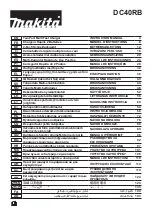
3
11
15.GB
Charging electronics extra option
(Aquamatic)
Z
The Aquamatic serves to control an
external solenoid valve of an automatic
water refilling system.
When a cell voltage of 2.4 V/cell is reached,
a relay contact (normally open contact,
contact rating 5 A) is triggered by the
following pulse train:
- 6-7 pulses with a duration of 3 sec., then
maintained contact for 7 min.
The contact is potential-free, a 230 V power
connection of the battery charger is
available.
Electrolyte circulation:
Z
The charger has an option for controlling an
electrolyte circulation pump.
M
Observe the respective manufacturer’s
guidelines! It should only be connected by
the manufacturer’s service department.
The Aquamatic and electrolyte circuluation
systems are monitored. Any faults are
displayed on the front panel.
M
The connection of external additional
equipment may only be carried out by
skilled electricians.
Z
To attach additional external equipment,
contact the manufacturer’s service
department.
Charging curve / pulse charging:
- T1 = Battery gassing phase reached.
Start of the recharging phase
- T2 = Start of the pulse charging phase
(1-5 pulses depending on the main
charging time)
- T3 = End of battery charge.
Z
If the battery remains attached to the
charger at the end of the charging time
(T3), there will follow an 8 minute trickle
charge every 8 hours and after 24 hours a
one-off compensation charge lasting
2 hours.
Characteristic curve:
Wa Charging characteristic
Uz Cell voltage (V/cell)
IL Charging current
(in % of rated current)
IdN Rated battery current
The curve of the Wa characteristic is
determined by points 1), 2) and 3):
1) 100 % IdN at V = 2.0V/cell
2) 50 %
IdN at V = 2,4V/cell
3) 25 %
IdN at V = 2,65V/cell
Z
A controlled thorough acid mixing by means
of current pulses is carried out at the end of
the recharging phase.
T
U
,
I
T
1
T
2
T
3
2,8V
2,6
2,4
2,2
2,0
1,8
2,65
0
25
50
75
100%
1)
2)
3)
I
L
/ I
dN
U
Z
14
11
15.GB
The internal electrolye stirrer consists of the
following parts:
- An additional switch contact to switch on
the pump;
- A sensor to switch or adapt the charging
factor;
- A membrane pump with an air filter and
air pressure monitor. The pump delivers
a constant pressure of 100 mbar and
overcomes an acid level of ca. 80 cm in
the main charging phase;
- A connecting hose with an air plug
connection in the pilot contacts of the
charging connector.
Air pressure monitor:
If the system is working correctly and the
recharging time is reduced, the green
LED (1) is lit on the control board.
Z
A defective hose system can be identified
via the air pressure monitor. Service
message flashes: (4x / break / 4x).
Air volume flow:
The air volume flow can be adjusted within
the range of 2 l/min to 12 l/min. It is
independent of the hose system and thus of
the number of cells.
The air volume flow can be set according to
requirements with the switch (3):
Item
Description
1
Green LED
2
Fuse (1 AT)
3
Switch
4
Cable to the charging switch
5
Filter
6
Air hose
1
2
3
4
5
6
Switch setting
top = 1
Volume
in l/min
Volume
in l/h
0000
2
120
1000
4
240
0100
6
360
0010
8
480
0001
10
600
1111
12
720
Summary of Contents for SLT 100
Page 1: ...SLT 100 SLT 100 Operating instructions 50451882 SLT 100 G 10 04 11 15...
Page 4: ...I2 0709 GB...
Page 23: ......
Page 24: ......








































